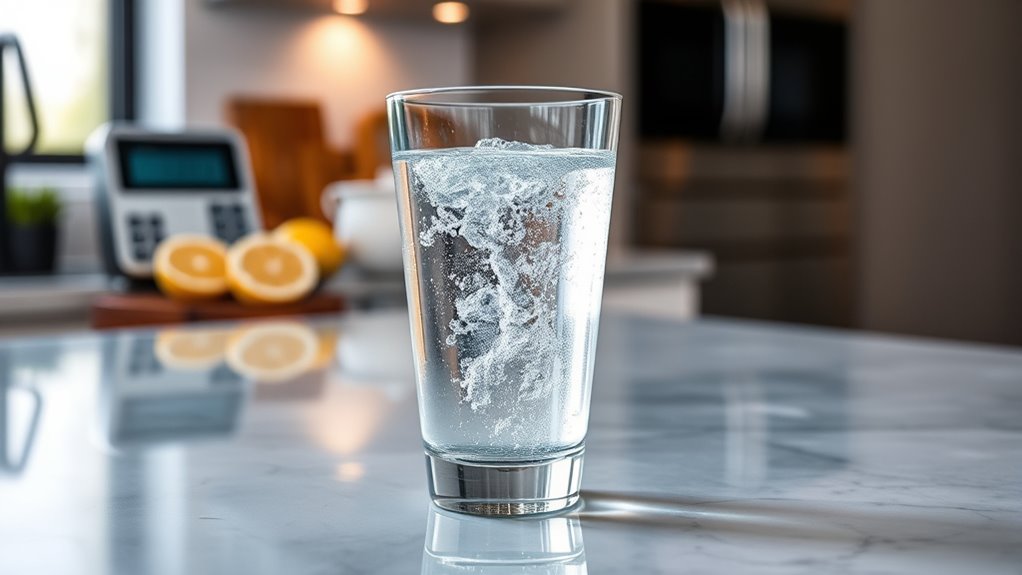Alkaline water is marketed with claims it improves hydration, benefits bone health, or relieves acid reflux, but scientific evidence is limited and inconclusive. While it’s generally safe in moderation, high pH levels can cause temporary stomach upset and potential health risks for certain individuals. Most benefits are not supported by rigorous research, and your body’s natural pH regulation maintains balance regardless of water type. To understand the facts behind these claims, explore what experts say about alkaline water’s true effects.
Key Takeaways
- Scientific evidence does not support significant hydration, anti-aging, or disease prevention benefits from alkaline water.
- Alkaline water’s higher pH neutralizes stomach acid temporarily but has limited impact on acid reflux or heartburn.
- Limited minerals in alkaline water are insufficient to meaningfully influence bone health or electrolyte balance.
- Excessive intake of high-pH water may disrupt body pH balance and cause health risks, especially in vulnerable individuals.
- Overall, alkaline water is generally safe in moderation, but health claims remain unproven and should be viewed with caution.
What Is Alkaline Water and How Is It Made?
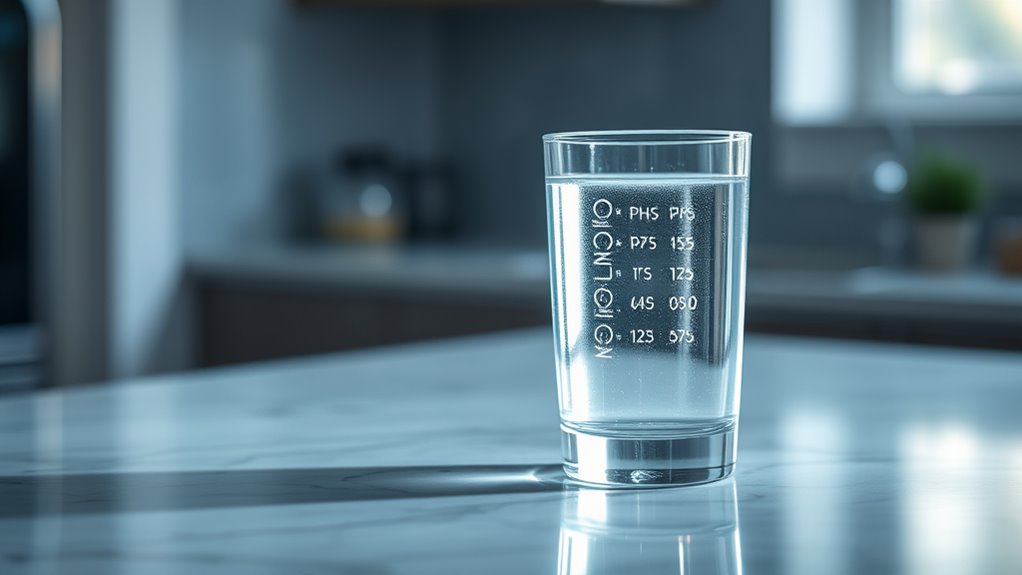
Alkaline water is water that has a higher pH level than regular tap water, typically between 8 and 9, making it less acidic. It can be naturally sourced from mineral-rich springs or artificially created through alkaline water production. This process often involves water electrolysis, where ionizer devices split water molecules to increase pH by separating alkaline (hydroxide) ions from acidic components. During this process, hydrogen content may also increase, contributing to potential health benefits. The minerals in water, like calcium, magnesium, or potassium, are added to boost alkalinity and improve water quality. Whether naturally or artificially produced, pH adjustment guarantees the water remains less acidic, resulting in a mineral-rich, ionized beverage that’s believed to support overall health. Additionally, understanding the influence of ancient cultures like the Hopi on natural resource preservation can provide insight into sustainable practices related to mineral extraction and water sourcing. The addition of minerals not only enhances alkalinity but also can improve the taste and mineral content of the water, making it more appealing and potentially more beneficial. Incorporating mineral balance principles can further optimize the water’s health properties and align with holistic wellness practices. Moreover, air purification methods used in water treatment plants ensure that the final product is safe and free from harmful contaminants, reflecting the importance of quality control. Furthermore, emerging water purification technologies aim to enhance mineral retention while ensuring safety and purity in bottled and filtered waters.
How Does Alkaline Water Differ From Regular Drinking Water?
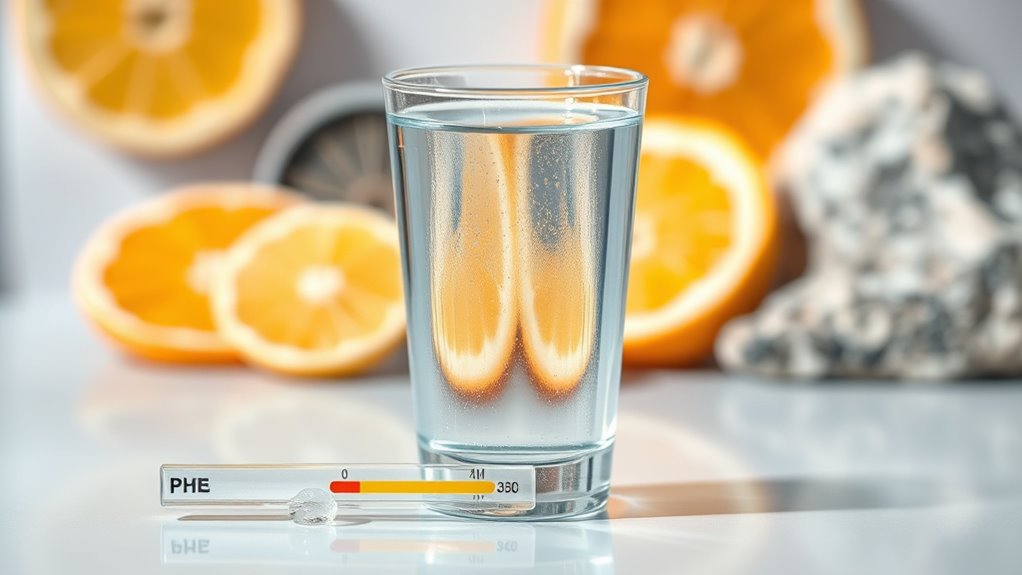
While both alkaline water and regular tap water are safe to drink, they differ mainly in their pH levels and how they’re produced.
Alkaline water has a pH above 7, usually between 8 and 9, making it less acidic than regular water, which has a neutral pH of around 7.
The main difference lies in its higher pH level, achieved naturally from mineral-rich springs or artificially through electrolysis with water ionizers.
Although alkaline water may contain trace minerals like calcium and magnesium, their amounts are minimal and don’t *considerably* impact mineral content compared to tap water.
The manufacturing process and resulting pH level set alkaline water apart, but both types generally provide similar hydration benefits.
Additionally, the quality of the water and the presence of high-quality content can influence its health benefits and consumer perception.
It is also important to consider regulatory standards to ensure the safety and quality of alkaline water products.
Furthermore, some studies suggest that alkaline water may help neutralize stomach acid, although more research is needed to confirm these effects.
Moreover, water pH levels can influence how the body interacts with different types of drinking water, impacting overall health.
Research on water ionization indicates that the method of producing alkaline water can affect its mineral composition and potential health benefits.
Does Alkaline Water Actually Improve Hydration?
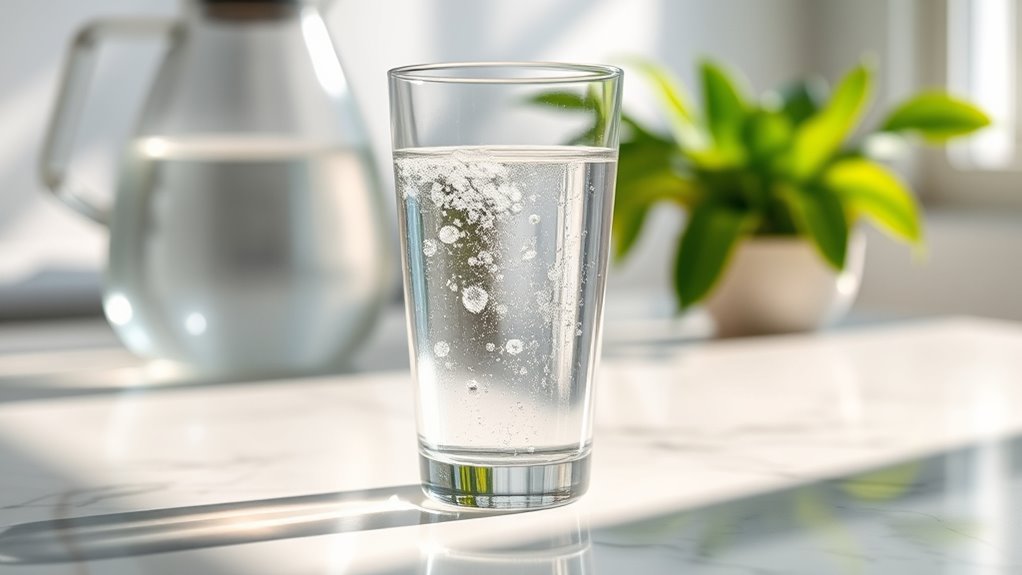
You might wonder if alkaline water helps you hydrate better, but research shows it hydrates as well as regular water. While some studies suggest it could aid recovery after exercise, the evidence isn’t strong enough to confirm a clear benefit. Additionally, hydration science indicates that drinking enough water, regardless of pH, is the key to staying properly hydrated. Recognizing angel number patterns can also serve as spiritual guidance for making healthier lifestyle choices. Additionally, understanding industry trends in voice-over work can help you make informed decisions about your health and career. Moreover, some Kia Tuning modifications, like ECU remapping, can optimize vehicle performance and efficiency. Staying informed about textile techniques can also inspire creative ways to personalize your hydration and wellness accessories.
Alkaline Water’s Absorption Rate
Although alkaline water has gained popularity for its supposed health benefits, research shows it doesn’t actually improve hydration efficiency.
The absorption rate of water remains consistent whether you drink alkaline water or regular water with a neutral pH. Your gastrointestinal system quickly adjusts to the pH level of ingested water, preventing alkaline water’s higher pH from substantially affecting water absorption or hydration. This adjustment highlights the body’s ability to regulate internal conditions effectively pH regulation mechanisms. Additionally, studies indicate that the body’s homeostatic balance maintains hydration levels independently of water pH. Body’s pH regulation mechanisms help keep internal conditions stable regardless of the type of water consumed. The body’s natural processes work to ensure hydration levels remain constant, regardless of water pH hydration regulation.
The body’s pH regulation mechanisms neutralize any potential difference, maintaining overall hydration regardless of water type. Drinking alkaline water doesn’t enhance hydration or water intake efficiency compared to standard water.
Its absorption rate is similar, meaning it doesn’t provide a hydration advantage. Overall, alkaline water’s impact on hydration remains comparable to that of regular, neutral pH water.
Impact on Exercise Hydration
Does alkaline water truly boost hydration during exercise? Some studies suggest that alkaline water may improve hydration efficiency by supporting electrolyte balance better than regular water. Its higher pH level might help slow acid buildup in muscles, potentially aiding in faster recovery. Additionally, AI security technologies analyzed through behavioral analytics can monitor for signs of dehydration or electrolyte imbalance, providing insights to enhance hydration strategies.
During exercise, maintaining hydration and electrolyte levels is vital, and drinking alkaline water could influence hydration markers positively. However, the body’s natural pH regulation quickly neutralizes alkaline water’s slight buffering effects, making its impact on hydration minimal in typical consumption. Physiological responses also play a role in how effectively your body utilizes different types of water during physical activity. Recent findings highlight the importance of overall hydration practices over specific water types, emphasizing that consistent water intake is key.
Emerging research indicates that the effects of alkaline water on hydration may vary depending on individual physiology and exercise intensity, suggesting a need for personalized hydration approaches.
Ultimately, hydration depends more on your total water intake than the type of water you drink. While some evidence hints at benefits, current research remains inconclusive about alkaline water’s actual impact on exercise hydration.
Mineral Content and Hydration
You might wonder if mineral content impacts hydration, so here’s what you should know:
- Mineral levels in alkaline water are generally too low to influence fluid balance appreciably.
- Proper hydration depends mainly on water volume intake, not water pH or mineral content.
- Electrolytes like calcium and magnesium help rehydration, but in larger amounts than found in typical alkaline water.
- Water absorption and rehydration are unaffected by trace minerals at these levels, regardless of pH level. Mineral concentrations are too minimal to make a significant difference.
- The cotton candy grapes are an example of innovative fruit breeding that combines sweetness with lower calorie content, but they do not impact hydration levels.
In short, drinking sufficient safe water, regardless of mineral content, is key for hydration, not the water’s mineral levels or pH.
Can Drinking Alkaline Water Influence Bone and Aging Processes?
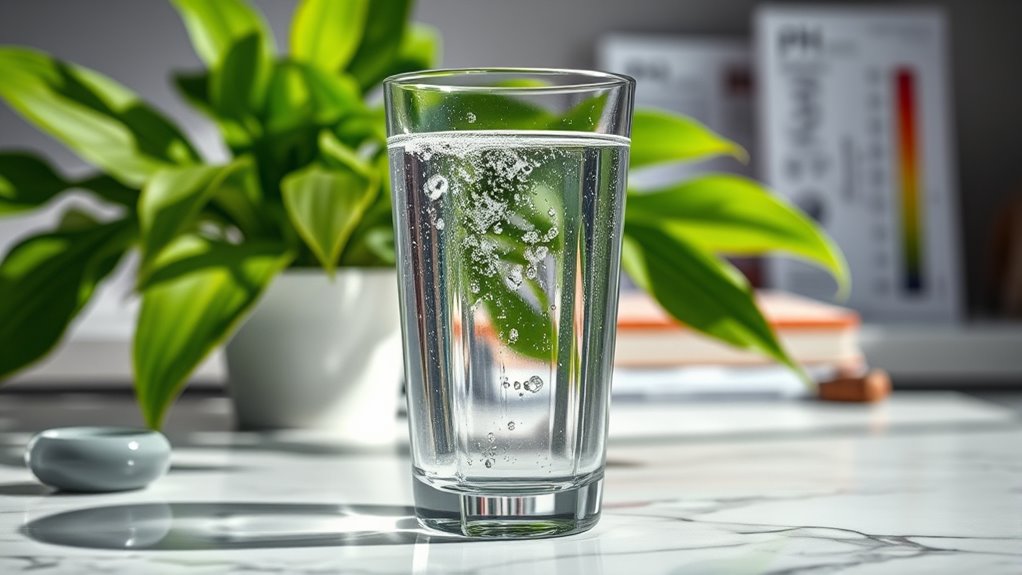
Drinking alkaline water might have some minor effects on bone health, but current evidence doesn’t support considerable impacts on aging processes. Some studies suggest that alkaline water could slow bone loss in osteoporosis by reducing calcium excretion, potentially improving bone mineral density. However, the body’s natural pH regulation mechanisms make it unlikely that drinking alkaline water markedly affects systemic health or aging. Most health claims about reversing or slowing aging lack scientific support. Maintaining good nutrition, hydration, and a balanced diet remains the best way to support healthy bones and aging.
| Effect | pH Level Impact | Bone Health Outcome | Scientific Evidence |
|---|---|---|---|
| Calcium excretion | Slight reduction possible | May benefit osteoporosis | Limited, inconclusive |
| Bone mineral density | Minor influence | Potential minor improvements | Not proven conclusively |
| Aging | No significant systemic effect | No proven impact on aging | Lacks scientific support |
| Overall health | Maintained through hydration | Supports systemic health | Best achieved via balanced diet |
What Are the Claimed Health Benefits of Alkaline Water?
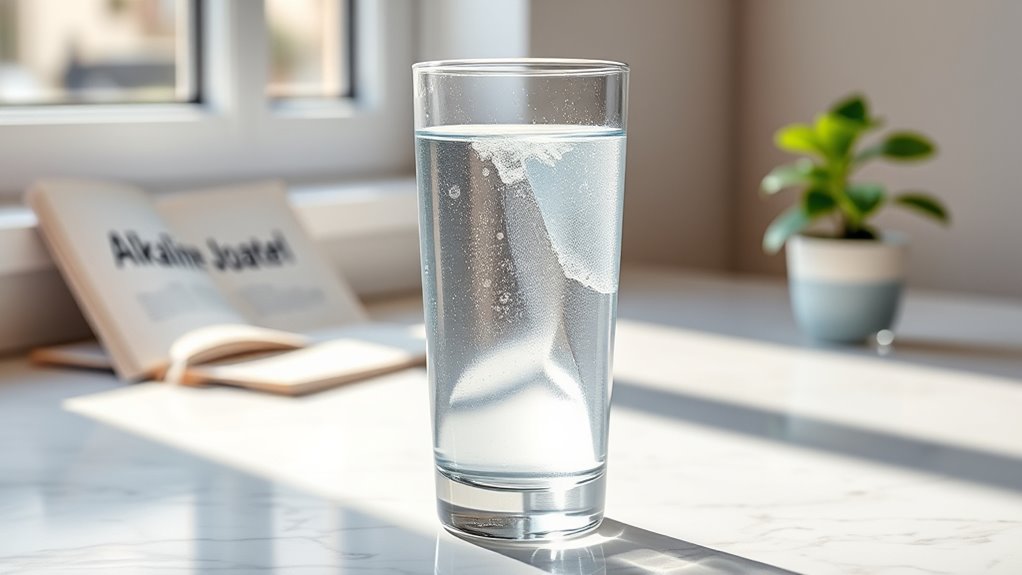
Many people turn to alkaline water because of claims that it can neutralize stomach acid and relieve heartburn, although scientific evidence supporting these effects is limited and mostly anecdotal.
Many claim alkaline water relieves heartburn, but scientific evidence remains limited and mostly anecdotal.
The supposed health benefits of alkaline water include:
- Improving hydration by balancing body pH levels.
- Supporting bone health, especially in osteoporosis patients.
- Reducing acid reflux and stomach acid-related discomfort.
- Preventing chronic diseases and slowing aging, though there’s no solid scientific proof.
However, the body naturally maintains a stable blood pH regardless of drinking alkaline water. Most health experts agree that regular hydration with plain water provides sufficient benefits, and claims that alkaline water substantially alters health or prevents diseases lack substantial scientific evidence.
Is There Evidence Supporting Alkaline Water for Heartburn and Acid Reflux?

Although some studies suggest that alkaline water might temporarily relieve heartburn and acid reflux symptoms by neutralizing stomach acid, the scientific evidence remains limited and inconclusive.
Alkaline water, with a higher pH level, may briefly buffer gastric juices, but once ingested, it has minimal impact on stomach acid due to the stomach’s high acidity (pH 1.5–3.5). Your body quickly produces gastric acid to maintain its natural balance, making the effect of alkaline water on stomach pH negligible.
Clinical trials show that antacids and acid-blocking medications are more effective for managing acid reflux.
Are There Risks or Downsides to Consuming Alkaline Water?
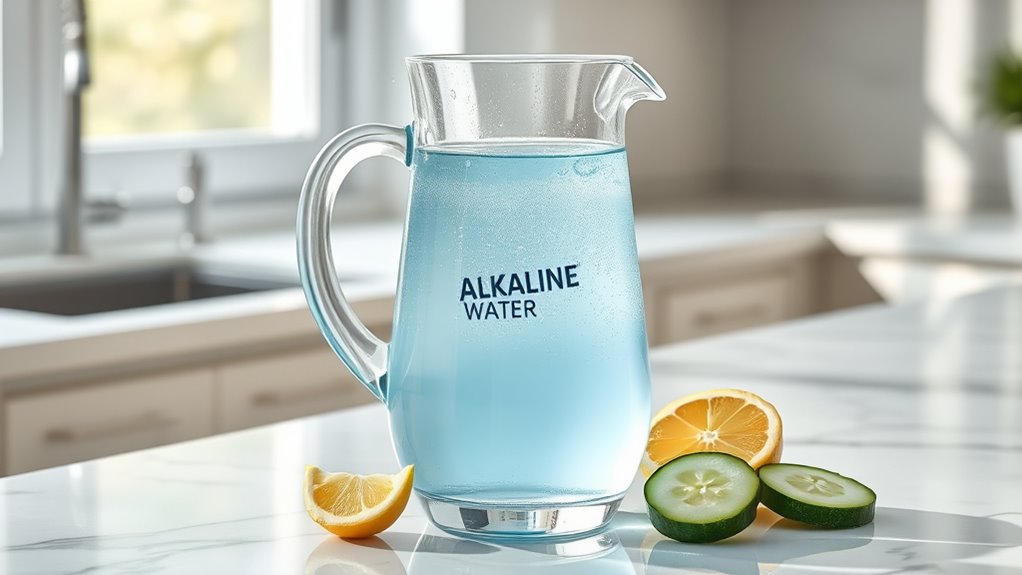
While moderate consumption of alkaline water is generally safe, drinking too much with a high pH can upset your body’s natural balance and cause discomfort.
If you have kidney issues or take certain medications, alkaline water might interfere with your treatment or worsen your condition.
It’s important to be cautious and consult with a healthcare professional if you have concerns or health conditions.
Potential Impact on Body Ph
Consuming alkaline water with a pH above 9 can temporarily raise your stomach’s pH level, but this effect is quickly neutralized by stomach acid, preventing significant changes in your overall body pH.
Your body maintains blood pH within a narrow range (7.35–7.45) through buffering systems, respiration, and kidney function, making large shifts unlikely.
However, regularly drinking excessive amounts of highly alkaline water might disrupt your acid-base balance, potentially leading to metabolic alkalosis.
Be aware that:
- Your systemic pH remains stable due to natural buffering systems.
- Overuse of alkaline water could interfere with kidney function.
- People with health conditions affecting acid-base balance should exercise caution.
- Moderate intake generally poses minimal health risks for healthy individuals.
Risks for Kidney and Medication Users
People with kidney disease need to be cautious when drinking alkaline water, as their kidneys may struggle to regulate the body’s pH balance effectively. Consuming high-pH alkaline water can pose health risks, especially for those with impaired kidney function, increasing the chance of metabolic alkalosis.
It can also interfere with medication interactions, such as proton pump inhibitors (PPIs), reducing their effectiveness. For medication users, alkaline water may alter drug absorption, impacting treatment outcomes.
If you have kidney disease or are on medication, it’s crucial to understand the potential alkaline water risks. Overconsumption might worsen kidney health or lead to metabolic imbalances.
Always consult your healthcare provider before adding alkaline water to your routine to prevent health risks and ensure safe consumption.
Who Should Be Cautious About Drinking Alkaline Water?
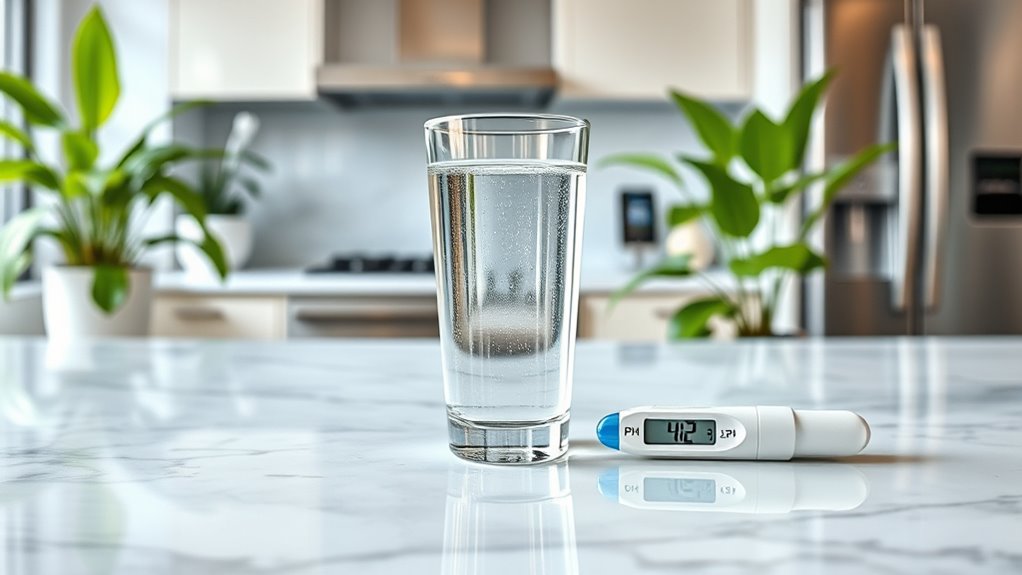
Certain individuals should be cautious about drinking alkaline water, especially those with specific health conditions or medications that could be affected by its high pH levels.
People with health conditions or medications should consult a doctor before drinking alkaline water.
If you have kidney disease, your kidneys may struggle to regulate your body’s pH, increasing health risks.
People taking proton pump inhibitors or other acid-suppressing medications might experience digestion issues due to altered stomach acidity.
Those with gastric disorders such as acid reflux or GERD should consult healthcare providers before drinking alkaline water, as it could impact digestive health.
Additionally, excessive intake of high pH water (above 9) can cause metabolic alkalosis, leading to symptoms like nausea or confusion.
Vulnerable groups, including pregnant women and children, should seek medical advice before regular consumption.
What Do Experts Say About the Long-Term Use of Alkaline Water?
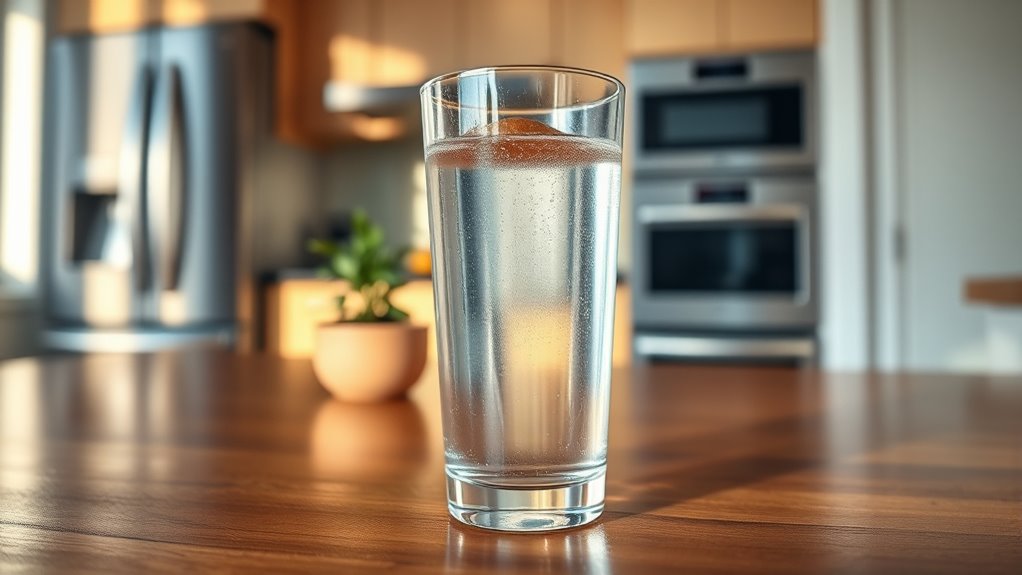
Experts generally agree that for healthy individuals, long-term use of alkaline water is safe because the body naturally regulates its pH levels without needing specialized water. While some believe it offers health benefits, the evidence for long-term safety and chronic disease prevention remains limited.
The body’s pH regulation systems effectively maintain balance, making mineral imbalance or gastrointestinal discomfort unlikely if pH levels stay below about 9.8. However, excessive alkaline water intake may pose risks to kidney health, especially for those with existing kidney issues or on certain medications.
Frequently Asked Questions
Is There Any Evidence for Alkaline Water?
You might wonder if alkaline water offers health benefits. Currently, scientific evidence doesn’t support significant advantages beyond hydration.
Your body naturally maintains its pH balance, so drinking alkaline water likely won’t change systemic acidity.
While some studies hint at minor effects on conditions like acid reflux, larger, high-quality research is needed.
As of now, claims that it can prevent diseases or slow aging aren’t backed by solid scientific proof.
What Do Doctors Say About Alkaline Water?
Imagine holding a glass of alkaline water, wondering if it’s truly good for your health. Doctors say there’s limited scientific proof supporting its benefits.
Your body naturally keeps its pH balanced, so drinking alkaline water probably won’t make much difference.
Too much could even cause problems, especially if you have kidney or digestive issues.
They recommend sticking to plain water for hydration, not relying on alkaline water as a health fix.
Are There Any Proven Benefits of Alkaline Water?
You might wonder if alkaline water offers proven benefits, but current research shows otherwise. You won’t find strong evidence that it improves health markedly or prevents diseases, as your body naturally maintains its pH balance.
While it may temporarily boost hydration or bone health, these effects aren’t clinically proven or lasting. So, drinking regular water remains just as effective for staying hydrated and healthy.
What Does the FDA Say About Alkaline Water?
You ask what the FDA says about alkaline water. The FDA hasn’t approved it as a treatment for any health condition, and it prohibits making unsubstantiated health claims.
They classify it as a food product, regulating its labeling and marketing to prevent false or misleading information.
Currently, the FDA states there’s no conclusive scientific evidence to support that alkaline water can change your body’s pH or improve your health.
Conclusion
While alkaline water is popular for its supposed health benefits, scientific evidence remains limited. Studies suggest that only a small percentage of people experience noticeable improvements, and long-term effects are still uncertain. notably, a recent survey found that 60% of consumers believe alkaline water helps with digestion, yet experts urge caution. Ultimately, staying hydrated with regular water and maintaining a balanced diet is your safest bet for overall health.
